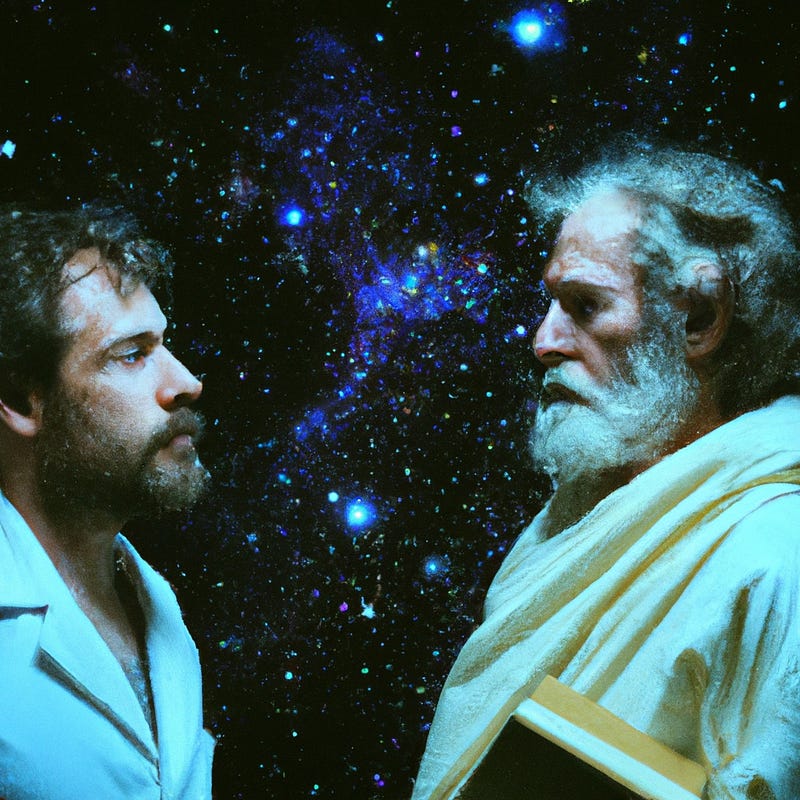Philosophy's Value: A Critical Examination of Its Contributions
Written on
Philosophy has long been viewed as a discipline that shapes our understanding of existence, yet its practical contributions often come into question, especially when juxtaposed with the successes of science. This article critically examines what philosophy has truly offered society.

The query "What has philosophy done for us?" echoes a famous scene from Monty Python's Life of Brian. In a humorous exchange, a character lists numerous benefits brought by the Romans, ultimately questioning their contribution amidst a long list of achievements. Similarly, the contributions of science to our civilization are extensive and undeniable.
Science not only propels material advancement but also provides a coherent framework for understanding our existence within the universe. Contrary to claims of nihilism, the scientific perspective is rich with meaning, as explored in my previous work, "Can we find meaning in the Universe?"
Nevertheless, philosophy often critiques science. Thinkers like Michel Foucault have dismissed science as merely another narrative supporting existing power structures, while others equate it with religion or mythology, failing to acknowledge its unique position as a reliable source of knowledge. This dichotomy underscores the distinct roles of science and philosophy, suggesting that philosophy cannot claim science as one of its triumphs.
In light of this, we must ask: what practical value does philosophy hold?
When searching for the utility of philosophy, the most prominent resources highlight various academic justifications for its study, ranging from improving analytical skills to engaging with modern issues. However, many of these reasons seem circular or vague, lacking the progressive development seen in scientific fields. Philosophy frequently circles back to ancient thinkers rather than building upon their ideas, resulting in a fragmented landscape of thought.
To assess the impact of philosophy, we can examine its major branches: epistemology, metaphysics, ethics, and aesthetics.
Epistemology: The Role of Critics
A humorous anecdote from my youth illustrates the relationship between science and philosophy: in a scenario where three men are working, one labors while the others critique his efforts. This mirrors the dynamic where scientists pursue knowledge, and philosophers often critique their methods.
Epistemologists, who study knowledge, sometimes seem more focused on pointing out flaws in scientific endeavors rather than contributing positively. This field includes the philosophy of science, logic, and critical thinking.
The Debate on Scientific Methodology
Karl Popper's influential notion that scientific hypotheses can only be falsified, rather than verified, initially resonated with many in the scientific community. However, this perspective has shifted towards a greater emphasis on verification, where hypotheses are rigorously tested through experimentation.
In my view: > "A scientist should formulate the most beautiful hypothesis he can. And then torture it with experiments until it confesses the truth."
Thomas Kuhn's concept of paradigm shifts in science also merits examination. While his ideas resonated with many, my experiences in the field revealed a more gradual evolution of scientific understanding, with few revolutionary changes as he proposed.
The Divergence of Science and Philosophy
The schism between science and philosophy stems from differing methodologies: science relies on induction, while philosophy leans towards logic. Inductive reasoning, fundamental to scientific inquiry, contrasts with the deductive reasoning prevalent in philosophical thought.
David Hume's critique of induction raises important questions about its circular nature, yet it remains a vital process in scientific discovery. Science has advanced beyond philosophical debates, developing sophisticated techniques such as statistics and mathematical modeling.
Metaphysics: The Role of Physics
Metaphysics, which explores the nature of reality, has largely been overshadowed by scientific inquiry. Physics tackles questions of existence, time, and space, with ongoing investigations into the fundamental structure of the universe.
Consciousness: The Neuroscience Frontier
Neuroscience is actively engaged in unraveling the complexities of consciousness, a task that philosophy has struggled to define adequately. While philosophers ponder abstract concepts, neuroscientists delve into the biological mechanisms behind our subjective experiences.
Ethics: A Fragmented Landscape
Ethics, or moral philosophy, comprises various schools of thought, including deontology, consequentialism, and virtue ethics. However, each faces significant challenges in establishing firm moral foundations. For instance, consequentialism relies on prior ethical frameworks to assess outcomes, while virtue ethics lacks a universally accepted definition of "virtue," leading to cultural discrepancies.
Philosophy has often missed opportunities to lead moral discussions during critical societal issues, such as slavery, racism, and gender equality. In these instances, it was often ordinary individuals who drove change, while philosophers remained largely silent.
The Ideological Divide in Philosophy
Historically, philosophy has contributed significantly to human thought, guiding societies through pivotal moments. However, in the 20th century, it became entangled in dogmatic ideologies, losing its connection to scientific progress and rational discourse.
The Future of Philosophy
Modern philosophers face significant criticism for failing to adapt to contemporary scientific advancements. Prominent scientists have openly questioned the relevance of philosophy, suggesting that it has stagnated in its evolution.
While philosophy may have once served a vital role in shaping human understanding, it now risks becoming irrelevant if it cannot align itself with scientific progress. The way forward may involve greater collaboration between scientists and philosophers, emphasizing the importance of intellectual integrity and independence.
In conclusion, it is essential for society to engage with philosophical questions through practical, science-informed approaches. By fostering a dialogue that prioritizes empirical understanding over ideological commitments, we can better navigate the complexities of modern existence.